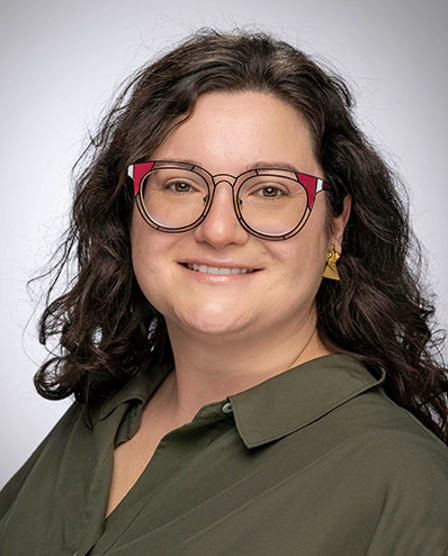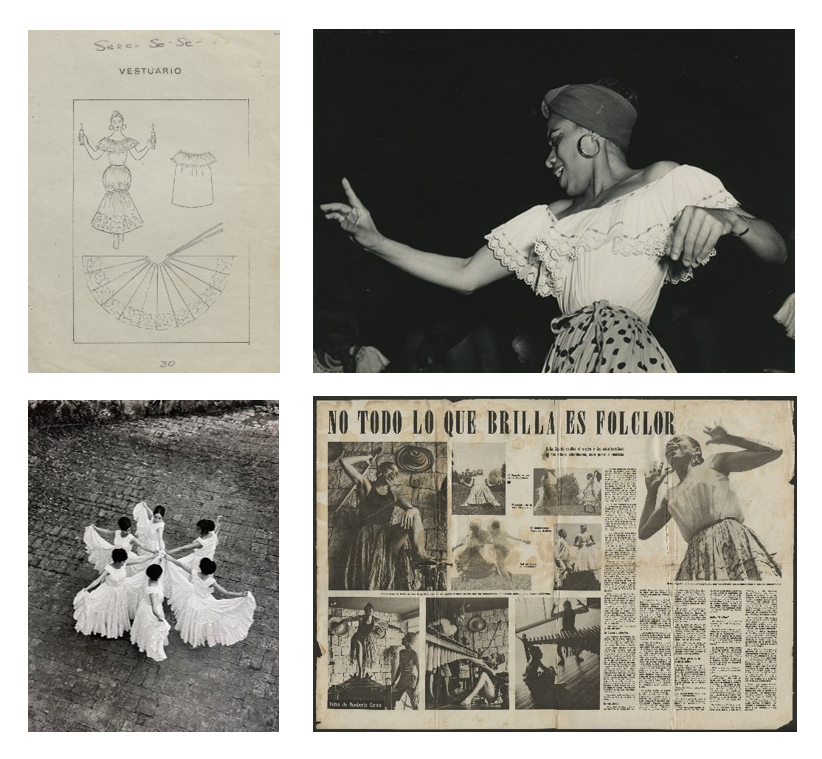Delia Zapata Olivella Collection: Open Access to Afro-Colombian Performing Arts Resources
For this semester’s faculty and staff spotlight, we are highlighting Archivist Sara Lee Burd and her work in the processing and digitization of the Delia Zapata Olivella collection. This collection documents the personal life and career of Delia Zapata Olivella (1926 – 2001), who was an ethnographer, dancer, choreographer, professor, and Colombian folklorist. In spring 2023, Burd presented the collection at the 51st Annual Art Librarians Society of North America (ARLIS) conference in Mexico City. Burd has worked across Vanderbilt’s campus: assisting with Development and Alumni Relations, coordinating at the Curb Center, teaching in Human Organization and Development, and currently archiving in the Heard Library’s Special Collections.
Please note that this interview has been edited for length and clarity.

Claire Campbell (Office for Arts & Libraries): To begin, can you tell us a little bit about yourself and your role as project archivist? What interested you most about working on the Delia Zapata Olivella Papers?
Sara Lee Burd: I have been working in the archive at Special Collections for nearly three years. The Delia Zapata Olivella Papers is the first collection that I processed and spurred my passion for continuing in archives. I applied for the position because of my background working in the arts and a curiosity for digging into boxes of documents, photographs, and artifacts. Being half-Colombian, I was thrilled at the opportunity to work with materials that had cultural significance to me. I remember the day when sorting clippings, I held a newspaper from my birthplace, Bogotá, on the date I was born. I felt connected to my other country, and honestly, this project helped me claim my Latinx heritage.
CC: How would you describe Delia Zapata Olivella? And what is included in this collection?
SLB: Oh, I wish I could have met her! From working with her papers and AV materials, I can tell you that she was a force to behold. From the 1940s through the early 2000s, she captivated audiences. While she received a degree in visual art, she shifted focus to performing arts. She danced throughout her life, which you can see in photos and videos in the collection. She choreographed and directed her own dance groups as well, and she was an accomplished professor who developed a dance and theater degree program in Bogotá, Colombia. This was important because it positioned Colombian folklore within the academy and created an avenue for her work to continue.
CC: How did this collection from Delia Zapata Olivella as well as a collection of her brother, the novelist Manuel Zapata Olivella, come to fruition at Vanderbilt?
SLB: The fully processed and digitized DZO papers at Vanderbilt resulted from an international effort begun by Latin American and Iberian Librarian Paula Covington. She acquired the Manuel Zapata Olivella and Delia Zapata Olivella collections in Colombia and supported the project through grants. She has many stories she could share about it. For example, her journey to see the DZO papers involved wading through a sea of people gathered for the Pope’s visit to Bogotá. The process from signing the gift agreement with the family to the completed online digitized papers today, involved different people at each stage including Viviana Quintero Marquez, Prisca Dorcas Mojica Rodríguez, Kathy Smith, Zach Johnson, Genevieve Arnold, and myself. I cherish my role of opening boxes, cleaning, creating the final organization, escorting it to the digital team, and promoting it as often as possible.
Having both Delia’s and Manuel’s papers together brings strength and consistency to the already robust collection that Vanderbilt owns from Colombia. Librarian Paula Covington saw the value and accomplished this goal for Vanderbilt. These siblings’ papers provide insight into the rich cultural movements that were developing and creating platforms for discussing race. In this case, not as direct as political philosophy, but through the symbolism and narrative of art.
CC: How was Zapata Olivella’s work culturally significant in Colombia? Globally?
SLB: Colombia’s mountainous terrain, rampant waterways, and grand size (that of California and Texas combined) naturally divide the country into regions. Delia’s work took her to these disparate locations to interview residents about their folkloric culture. As an ethnographer, she captured the stories, sounds, and symbolism of folkloric practices that she encountered in rural areas. Throughout her career, she shared folk histories, attire, instruments, and movements from across Colombia. She played an important role in connecting Colombians across the country to the African, Indigenous, and Spanish roots of their folkloric culture.
Delia did not stop with national recognition; the dance group performed at numerous international folk festivals and stages worldwide. The collection of posters, programs, and photographs shows how her band of performers traveled through the United States, France, Italy, Spain, China, and Russia. Her commitment to showcasing Colombian culture ran deep as she even hosted the first international folk festival in Colombia. If you look at her correspondence, you can see just how hard that was to accomplish.
CC: How was your experience presenting the DZO papers at an international conference? What did you want your audience at the ARLIS conference to take away?
SLB: Presenting at ARLIS was a dream. I am passionate about Delia’s work and the conference was another chance to show off her group and continue Delia’s mission of sharing Colombian folkloric culture. I wanted everyone to know of her as a powerful historical figure who should be researched. The audience of art librarians asked questions about her papers, how they came to Vanderbilt, and how we approach issues of cultural patrimony. I felt confident and proud of the steps the university had taken to ensure accessibility. Vanderbilt’s commitment to digitizing a complete collection of an Afro-Indigenous Colombian woman was noted by others as outstanding.
CC: Why is the digitization of the DZO papers or similar collections important? How has working on this project shaped your views of providing access to and preserving collections?
SLB: Digitizing the DZO papers allows people around the world to learn about Colombian folkloric culture. Because this collection is formed of papers from Colombia, we must be concerned with the fact that many Colombian people will not be able to encounter them. Coming to Vanderbilt requires some scholars to obtain visas to enter the United States, which are costly and not guaranteed. Many people have institutional support, but for most, the cost of travel and accommodation is prohibitive. By digitizing this collection and most importantly—making it freely available without a VUNet ID or password—Vanderbilt is modeling best practices for materials that originate outside of the country. With cultural patrimony taking center stage in current collecting conversations, this institution’s focus on accessibility both by digitizing the entire collection and promoting it without constraints, shows that Vanderbilt is taking a lead in equitable access.
CC: Whom would you encourage to explore this archive? Are its materials more useful to scholars or does it have a broader potential?
SLB: I would encourage anyone to explore this archive. I value it for its vibrant imagery and storytelling. I think that a performing arts group could learn from the scripts, attire, and hand-drawn chorographic sketches she made. It would be a great day for me to see music students perform from the original scores and hand-written folkloric songs. Primarily in Spanish, the collection also offers foundations in Colombian social history, spirituality, 20th-century arts administration, folkloric history, academia, and poetry.
The Delia Zapata Olivella Papers were acquired by the Vanderbilt University Special Collections in 2013, and this collection can be explored in its entirety on JSTOR. The collection is divided into eleven categories: personal, career, newspaper and magazine clippings, spirituality, posthumous, original art, photographs, posters and flyers, oversize, realia, and audiovisual.
